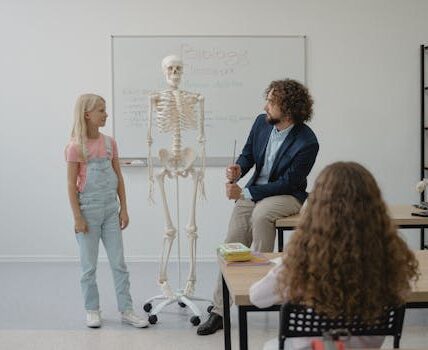-
Table of Contents
“Unlock your child’s full potential with our Montessori program, conveniently located near you.”
Montessori schools are a popular choice for parents looking for an alternative education option for their children. These schools follow the educational approach developed by Dr. Maria Montessori, which focuses on fostering independence, self-directed learning, and hands-on experiences. If you are interested in finding a Montessori school near you, there are likely several options available in your area. In this introduction, we will explore the benefits of Montessori education and how to find a Montessori school near you.
Benefits of Enrolling Your Child in a Montessori School Near Me
Montessori education has gained popularity in recent years, with more and more parents opting to enroll their children in Montessori schools. This educational approach, developed by Dr. Maria Montessori in the early 1900s, focuses on fostering independence, self-directed learning, and hands-on experiences. If you are considering enrolling your child in a Montessori school near you, here are some benefits to keep in mind.
One of the main advantages of enrolling your child in a Montessori school near you is the individualized approach to learning. In a traditional classroom setting, children are expected to follow a set curriculum and pace, regardless of their individual needs and abilities. However, in a Montessori school, the curriculum is tailored to each child’s unique learning style and pace. This allows children to progress at their own speed and focus on areas where they need more support, leading to a more personalized and effective learning experience.
Another benefit of Montessori education is the emphasis on hands-on learning. In a Montessori classroom, children are encouraged to use their senses and explore their environment through various activities and materials. This approach not only makes learning more engaging and fun for children but also helps them develop important skills such as problem-solving, critical thinking, and creativity. By actively participating in their learning, children are more likely to retain information and develop a deeper understanding of concepts.
Montessori schools also promote independence and self-directed learning. In a traditional classroom, the teacher is the main source of information and instruction. However, in a Montessori classroom, the teacher acts as a guide, allowing children to take charge of their learning. This approach fosters independence and self-motivation, as children are encouraged to make their own choices and decisions. As a result, children develop a sense of responsibility for their education and become more confident in their abilities.
In addition to academic development, Montessori education also focuses on the holistic development of a child. The Montessori approach recognizes that children are not just learners but also individuals with emotional, social, and physical needs. Therefore, in a Montessori school, children are given opportunities to develop these aspects of their personality. For example, through group activities and collaborative projects, children learn to work together and develop social skills. They also have designated time for physical activities, such as outdoor play, which promotes physical development and a healthy lifestyle.
Furthermore, Montessori schools often have a diverse student population, which exposes children to different cultures, backgrounds, and perspectives. This diversity not only promotes cultural awareness and understanding but also prepares children for the real world, where they will interact with people from various backgrounds. In a Montessori classroom, children learn to respect and appreciate differences, which is an essential skill in today’s globalized society.
Lastly, enrolling your child in a Montessori school near you can also benefit you as a parent. Montessori education encourages parental involvement and communication between parents and teachers. This allows parents to have a better understanding of their child’s progress and development, and also provides opportunities for parents to be actively involved in their child’s education.
In conclusion, there are numerous benefits to enrolling your child in a Montessori school near you. From a personalized and hands-on learning experience to the development of important life skills, Montessori education offers a holistic approach to education. It also promotes diversity, independence, and parental involvement, making it an attractive option for many parents. If you are considering a Montessori school for your child, be sure to research and visit different schools to find the best fit for your child’s needs and your family’s values.
Exploring the Montessori Method: What Makes it Unique and Effective?

The Montessori method of education has been gaining popularity in recent years, with more and more parents seeking out Montessori schools for their children. But what exactly is the Montessori method and what makes it unique and effective? In this article, we will explore the key principles of the Montessori approach and how it differs from traditional education methods.
The Montessori method was developed by Dr. Maria Montessori in the early 1900s. Dr. Montessori was a physician and educator who believed that children have a natural desire to learn and that they should be given the freedom to explore and discover at their own pace. This belief is at the core of the Montessori method and sets it apart from traditional education methods.
One of the key principles of the Montessori method is the emphasis on hands-on learning. In a Montessori classroom, children are given a variety of materials and activities that they can manipulate and explore. These materials are designed to be self-correcting, meaning that children can learn from their mistakes without the need for constant correction from a teacher. This approach allows children to develop their problem-solving skills and encourages independence and self-motivation.
Another unique aspect of the Montessori method is the mixed-age classrooms. In traditional education, children are grouped together based on their age, but in a Montessori classroom, children of different ages are placed together. This allows for a more natural and diverse learning environment, where younger children can learn from older ones and older children can reinforce their knowledge by teaching younger ones. This also promotes a sense of community and encourages children to develop empathy and social skills.
The role of the teacher in a Montessori classroom is also different from that of a traditional teacher. In a traditional classroom, the teacher is seen as the authority figure and the one who imparts knowledge to the students. In a Montessori classroom, the teacher is more of a guide or facilitator. They observe the children and provide guidance and support when needed, but ultimately, the children are responsible for their own learning. This approach fosters a sense of responsibility and self-discipline in children, as they are given the freedom to make their own choices and learn from their own experiences.
One of the most significant differences between the Montessori method and traditional education is the focus on the whole child. In traditional education, the emphasis is often on academic achievement, with little attention given to the child’s emotional and social development. In contrast, the Montessori method recognizes that a child’s emotional and social well-being is just as important as their academic progress. Therefore, the curriculum includes activities that promote emotional intelligence, social skills, and practical life skills, in addition to academic subjects.
The Montessori method also places a strong emphasis on the child’s environment. In a Montessori classroom, the environment is carefully designed to promote independence, exploration, and concentration. The materials are organized and displayed in an aesthetically pleasing manner, and the classroom is kept clean and orderly. This environment encourages children to take care of their surroundings and develop a sense of respect and responsibility.
In conclusion, the Montessori method is a unique and effective approach to education that focuses on the child as a whole. It promotes hands-on learning, mixed-age classrooms, and a role for the teacher as a guide rather than an authority figure. By emphasizing the child’s natural desire to learn and providing a nurturing and stimulating environment, the Montessori method allows children to reach their full potential and become independent, confident, and well-rounded individuals. So if you are searching for a Montessori school near you, you can be assured that your child will receive a holistic education that will prepare them for success in all aspects of life.
Finding the Best Montessori Near Me: Tips for Choosing the Right School
Montessori education has gained popularity in recent years for its child-centered approach and emphasis on hands-on learning. As a parent, you may be considering enrolling your child in a Montessori school, but with so many options available, it can be overwhelming to find the best one near you. In this article, we will discuss some tips for choosing the right Montessori school for your child.
First and foremost, it is important to understand the philosophy behind Montessori education. Developed by Dr. Maria Montessori in the early 1900s, this approach focuses on fostering independence, self-directed learning, and respect for each child’s unique abilities and interests. Montessori classrooms are designed to be child-friendly, with a variety of materials and activities that allow children to learn at their own pace and in their own way.
When looking for a Montessori school near you, it is crucial to visit the school and observe the classroom in action. This will give you a better understanding of how the school implements the Montessori philosophy and whether it aligns with your own beliefs and values. During your visit, pay attention to the classroom environment, the interactions between the teachers and students, and the overall atmosphere of the school.
Another important factor to consider is the qualifications and experience of the teachers. Montessori teachers undergo specialized training to understand the philosophy and methodology of this approach. They also have a deep understanding of child development and are skilled in creating a nurturing and stimulating learning environment. It is essential to inquire about the teachers’ qualifications and experience to ensure that your child will be in capable hands.
In addition to the teachers, it is also crucial to consider the school’s accreditation and affiliations. Montessori schools can be accredited by various organizations, such as the American Montessori Society or the Association Montessori Internationale. These accreditations ensure that the school follows the Montessori principles and meets certain standards of education. Affiliations with these organizations also provide opportunities for professional development for the teachers and access to a network of other Montessori schools.
The classroom materials and activities are an integral part of the Montessori approach. These materials are carefully selected to promote hands-on learning and allow children to explore and discover concepts on their own. When visiting a Montessori school, take note of the materials available and how they are used in the classroom. A well-equipped classroom with a variety of materials is a good indication of a quality Montessori program.
It is also essential to consider the school’s curriculum and how it aligns with your child’s needs and interests. Montessori education is not a one-size-fits-all approach, and each school may have a slightly different curriculum. Some schools may focus more on academic subjects, while others may have a more holistic approach, incorporating art, music, and outdoor activities. It is crucial to find a school that offers a curriculum that will cater to your child’s individual needs and interests.
Lastly, consider the school’s community and parent involvement. Montessori education emphasizes the importance of community and encourages parents to be actively involved in their child’s education. Inquire about the school’s parent involvement policies and opportunities for parent-teacher communication. A strong sense of community and parent involvement can greatly enhance your child’s learning experience.
In conclusion, finding the best Montessori school near you requires careful consideration of various factors, including the school’s philosophy, teachers, accreditation, curriculum, and community. By visiting the school, asking questions, and doing thorough research, you can make an informed decision and choose the right Montessori school for your child. Remember, each child is unique, and finding the right fit is crucial for their academic and personal growth.
The Role of the Montessori Teacher: How They Support Your Child’s Development
Montessori education has gained popularity in recent years, with more and more parents seeking out this alternative approach to traditional schooling. One of the key elements of the Montessori method is the role of the teacher. Unlike in traditional classrooms where the teacher is the center of attention, the Montessori teacher takes on a different role – that of a guide and facilitator. In this article, we will explore the role of the Montessori teacher and how they support your child’s development.
First and foremost, it is important to understand that the Montessori teacher is not just a teacher, but also a trained observer. They are constantly observing the children in their classroom, taking note of their interests, strengths, and areas for growth. This allows them to tailor their lessons and activities to meet the individual needs of each child. In a Montessori classroom, there is no one-size-fits-all approach. The teacher understands that each child is unique and learns at their own pace.
The Montessori teacher also plays a crucial role in creating a prepared environment for the children. The classroom is carefully designed and arranged to promote independence, exploration, and discovery. The materials are carefully chosen and placed on low shelves, allowing the children to access them easily. The teacher’s role is to introduce the materials to the children and then step back, allowing them to explore and learn on their own. This fosters a sense of independence and self-motivation in the children.
Another important aspect of the Montessori teacher’s role is to foster a sense of community within the classroom. In a Montessori classroom, children of different ages are grouped together, allowing for peer learning and collaboration. The teacher encourages and facilitates this collaboration, creating a sense of belonging and respect among the children. This not only promotes social skills but also helps in the development of empathy and understanding towards others.
One of the key principles of the Montessori method is the idea of following the child. This means that the teacher follows the child’s interests and allows them to take the lead in their learning. The teacher acts as a guide, providing support and guidance when needed, but ultimately allowing the child to take ownership of their learning. This approach not only promotes a love for learning but also helps in developing critical thinking and problem-solving skills.
In a Montessori classroom, the teacher also takes on the role of a model for the children. They model grace, courtesy, and respect towards others, creating a positive and nurturing environment for the children to thrive in. The teacher also models the use of the materials, showing the children how to use them correctly and respectfully. This not only helps in developing practical life skills but also instills a sense of responsibility and care for the environment.
Lastly, the Montessori teacher plays a crucial role in supporting the overall development of the child. They understand that education is not just about academics but also about the development of the whole child – socially, emotionally, and physically. The teacher works closely with the child, identifying their strengths and areas for growth, and providing individualized support and guidance. This holistic approach to education ensures that the child is well-rounded and prepared for the challenges of the future.
In conclusion, the role of the Montessori teacher goes beyond just teaching. They are observers, guides, facilitators, and models for the children. They create a prepared environment, foster a sense of community, and support the overall development of the child. The Montessori teacher plays a crucial role in helping children reach their full potential and become independent, confident, and lifelong learners. So if you are searching for a Montessori near you, rest assured that your child will be in the hands of a dedicated and skilled teacher who will support their growth and development in every way possible.
Q&A
1) What is the Montessori approach to education?
The Montessori approach to education is a child-centered method that focuses on fostering independence, self-directed learning, and hands-on experiences. It emphasizes the importance of following a child’s natural development and interests, rather than a strict curriculum.
2) How can I find a Montessori school near me?
You can search for Montessori schools near you by using online directories, such as the American Montessori Society’s school locator tool, or by asking for recommendations from friends, family, or local parenting groups.
3) What age range do Montessori schools typically cater to?
Montessori schools typically cater to children between the ages of 2-6 years old, although some schools may offer programs for older children as well.
4) What are the benefits of a Montessori education?
Some potential benefits of a Montessori education include promoting independence and self-motivation, fostering a love for learning, and developing critical thinking and problem-solving skills. It also encourages social and emotional development and a sense of community within the classroom.In conclusion, Montessori schools offer a unique and effective approach to education that focuses on individualized learning and hands-on experiences. By locating a Montessori school near you, you can provide your child with a well-rounded education that promotes independence, creativity, and a love for learning. With trained and dedicated teachers, a supportive community, and a child-centered curriculum, Montessori schools are a great option for families seeking a holistic and personalized education for their children. Consider researching and visiting Montessori schools near you to see if it is the right fit for your child’s educational journey.



